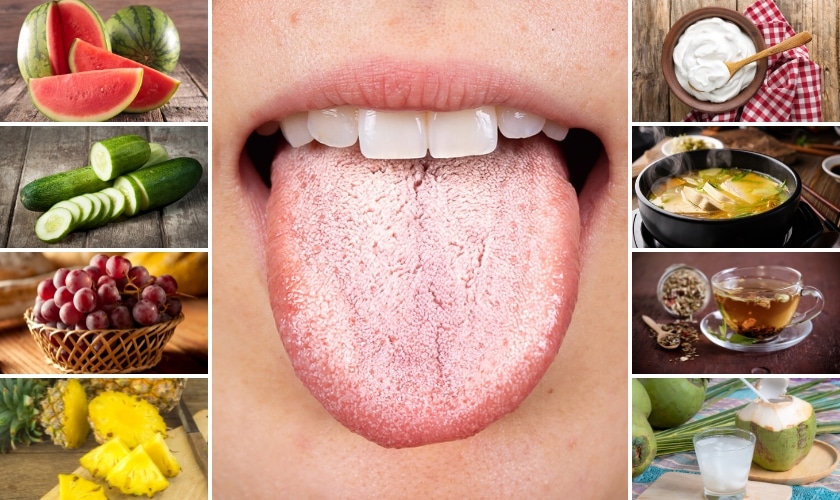10 Best Foods to Eat When You Have Dry Mouth Rancho Cucamonga, CA

Dry mouth, also known as xerostomia, is a condition where the salivary glands do not produce enough saliva to keep the mouth moist. This can lead to discomfort, difficulty swallowing, and an increased risk of dental issues such as cavities and gum disease. If you’re experiencing dry mouth, choosing the right foods can help alleviate some of the symptoms and promote oral health. Here’s a list of the best foods to eat when you have a dry mouth.
1. Water-Rich Fruits
Watermelon, cucumbers, and oranges are excellent choices for maintaining oral health due to their high water content. These fruits help keep your mouth hydrated, which is essential for maintaining a healthy saliva flow that aids in digestion and oral health. Additionally, they provide essential vitamins and nutrients, such as vitamin C and antioxidants, which support overall health and strengthen gums. Incorporating these water-rich fruits into your diet can contribute to both hydration and nutritional balance.
- Watermelon: Contains over 90% water, making it highly hydrating.
- Oranges: Rich in vitamin C, which is beneficial for oral health.
- Cucumbers: They are low in calories and high in water, but they are gentle on the mouth.
2. Soft, Moist Vegetables
Choosing soft, moist vegetables can be particularly beneficial, especially when your mouth is dry. Opt for steamed vegetables or those prepared with a bit of oil to add moisture and make them easier to chew. Vegetables such as carrots, sweet potatoes, and spinach are not only nutritious but also gentle on the mouth. Their natural moisture and texture make them more comfortable to eat and help ensure you get essential vitamins and minerals without causing discomfort.
- Carrots: High in vitamins A and C and softer when steamed.
- Sweet Potatoes: They provide a good source of vitamin A and are easier to eat when cooked.
- Spinach: Rich in iron and moisture, especially when steamed or sautéed.
3. Low-Fat Yogurt
Low-fat yogurt is an excellent choice for soothing a dry mouth due to its creamy and moist texture. It provides relief by adding hydration and is gentle on your oral tissues. Additionally, yogurt contains beneficial probiotics, which support oral health by promoting a balanced mouth microbiome and aiding digestion. These probiotics can help reduce harmful bacteria in the mouth, contributing to better overall oral hygiene and digestive health.
- Plain Yogurt: Avoid yogurts with added sugars; opt for plain or low-fat varieties.
4. Broths and Soups
Broths and soups are excellent for maintaining hydration and delivering essential nutrients. They can be soothing and easy to consume, especially when dealing with dry mouth. To avoid exacerbating the condition, choose low-sodium versions, as excessive salt can further dry out your mouth and lead to discomfort. These options provide warmth, hydration, and a variety of vitamins and minerals, making them a beneficial addition to your diet for overall health and well-being.
- Chicken Broth: A comforting and hydrating option.
- Vegetable Soup: Provides hydration and a range of nutrients.
5. Moist, Lean Proteins
Opt for moist, tender proteins such as chicken, fish, and tofu to make eating easier, especially if you have a dry mouth. These proteins are generally softer and more manageable compared to dry or tough meats, which can be harder to chew and swallow. Incorporating these moist options into your diet helps ensure you get adequate protein without discomfort. They provide essential nutrients while being gentle on your oral tissues, making them a suitable choice for maintaining good nutrition.
- Chicken: Moist and easy to chew, especially when cooked well.
- Fish: Rich in omega-3 fatty acids and easier to digest.
- Tofu: Soft and versatile, making it a good option for adding moisture to meals.
6. Herbal Teas
Herbal teas, such as chamomile or peppermint, offer soothing and hydrating benefits. These teas are gentle on the throat and can help keep you hydrated, making them a good choice for dry mouth relief. However, it’s best to avoid caffeinated teas, as caffeine can contribute to dehydration and exacerbate dry mouth. Herbal teas provide a comforting and beneficial alternative, helping to maintain moisture and promote relaxation while avoiding the dehydrating effects of caffeine.
- Chamomile Tea: Known for its soothing properties.
- Peppermint Tea: Can provide a refreshing taste without caffeine.
7. Cheese
Soft cheeses like mozzarella and cream cheese are moist and easy to eat, making them ideal for those with a dry mouth. These cheeses provide a good source of calcium and protein, essential for maintaining strong teeth and overall health. Their creamy texture helps soothe the mouth and can be more comfortable to consume compared to harder cheeses. Incorporating soft cheeses into your diet can help ensure you get vital nutrients while minimizing discomfort from dry mouth.
- Mozzarella: Mild and creamy, making it easy to eat.
- Cream Cheese: Smooth and can be added to various dishes.
8. Smoothies
Fruit and vegetable smoothies are superb for both hydration and nutrition. They offer a refreshing way to increase your fluid intake and are packed with essential vitamins and minerals. To make them even more hydrating, use water or yogurt as a base. Incorporating a variety of fruits and vegetables into your smoothies can provide a broad range of nutrients, helping to support overall health while being gentle on a dry mouth. They are a versatile and tasty option for maintaining optimal hydration and nutrition.
- Berry Smoothie: Rich in antioxidants and hydrating.
- Green Smoothie: Includes spinach or kale for added nutrients.
9. Oatmeal
Oatmeal is an ideal choice for those with a dry mouth due to its soft, moist texture, which makes it easier to eat and swallow. It’s a nutritious option rich in fiber, which supports digestive health and helps maintain a feeling of fullness. Oatmeal can be customized with various toppings, such as fruits, nuts, or yogurt, to enhance its flavor and nutritional value. This flexibility allows you to create a satisfying and healthful meal that caters to your dietary preferences while being gentle on your oral tissues.
- Plain Oatmeal: This can be sweetened with honey or fruit for added flavor.
10. Nuts and Seeds
Though nuts and seeds are typically dry, soaking or softening them can make them easier to chew, especially for those with a dry mouth. For example, soaked almonds or chia seeds become more manageable and can provide valuable nutrients like healthy fats, protein, and fiber. These nutrients support overall health and can be beneficial for maintaining energy levels. Soaking nuts and seeds not only improves their texture but also enhances their digestibility, making them a more comfortable option for your diet.
- Chia Seeds: Soaked chia seeds form a gel-like consistency, which can be easier to consume.
- Almonds: When soaked, they become softer and easier to chew.
Tips for Managing Dry Mouth
- Stay Hydrated: Drink plenty of water throughout the day to help keep your mouth moist.
- Avoid Caffeine and Alcohol: These can contribute to dryness and exacerbate symptoms.
- Use Saline Sprays: Over-the-counter saline sprays can provide temporary relief.
- Chew Sugar-Free Gum: Stimulates saliva production and helps keep your mouth moist.
Effectively managing dry mouth requires making informed dietary choices and adopting practices that enhance hydration and oral health. Including water-rich fruits, soft vegetables, and moist proteins in your diet can help alleviate the discomfort associated with dry mouth. If you continue to experience dry mouth despite these efforts, consult Dr. Andrea Choi, your Rancho Cucamonga dentist, for a thorough evaluation and personalized treatment options.
Act today to manage your dry mouth effectively! Incorporate these beneficial foods into your routine and explore additional solutions to maintain comfort and oral health. Maintaining a regular oral hygiene routine is also crucial for managing dry mouth. For personalized advice and support, schedule a visit with your dentist. Investing in your oral health is essential for overall well-being.



